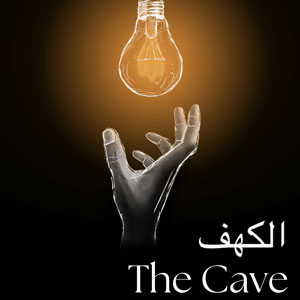
 **** H. Adoni Esho, in a touching performance, stars in “The Cave”, an extremely timely and well-acted story, directed by Alex Mallory and written by Sadieh Rifai, an Ensemble member at A Red Orchid Theatre. Esho plays the part of Jamil, a plain-spoken Palestinian husband and father. He is a decent guy with a sense of honor, who wants to fulfill his life’s dream in the United States. Originally from the West Bank, Jamil came to this country to get away from the situation in Israel/Palestine and also to escape an arranged marriage. During his college years, he met his wife Bonnie (Kirsten Fitzgerald), and they made for a couple, totally in love with each other. She converted from Christianity to Islam to marry him, and they had two lovely children together. We follow Jamil and his family during the years 1990 and 1991, coinciding with the invasion of Kuwait and first Iraq War. At this point in time, their older daughter Dema (Aaliyah Montana) was thirteen years old and their younger daughter Noor (Milla Liss) was three years younger.
**** H. Adoni Esho, in a touching performance, stars in “The Cave”, an extremely timely and well-acted story, directed by Alex Mallory and written by Sadieh Rifai, an Ensemble member at A Red Orchid Theatre. Esho plays the part of Jamil, a plain-spoken Palestinian husband and father. He is a decent guy with a sense of honor, who wants to fulfill his life’s dream in the United States. Originally from the West Bank, Jamil came to this country to get away from the situation in Israel/Palestine and also to escape an arranged marriage. During his college years, he met his wife Bonnie (Kirsten Fitzgerald), and they made for a couple, totally in love with each other. She converted from Christianity to Islam to marry him, and they had two lovely children together. We follow Jamil and his family during the years 1990 and 1991, coinciding with the invasion of Kuwait and first Iraq War. At this point in time, their older daughter Dema (Aaliyah Montana) was thirteen years old and their younger daughter Noor (Milla Liss) was three years younger.
Towards the beginning, we learn that Bonnie’s young nephew Jay was recently killed in Las Vegas, and he was the same age as their younger daughter. To escape memories of that event, the family made the move from Las Vegas to a gated condominium development near Columbus, Ohio, where they now live in a townhome. In part, this living situation was chosen because it was thought to be more protected than being in a single-family house. We are told that they now live close by to some of Jamil’s family members who run a gas station, where Jamil will now work. But condominium life means all sorts of condominium rules. That’s where Gail, their nosy and solicitous neighbor (Ashley Neal) enters the picture, and she appears to be a Christian fundamentalist. Though friendly enough, there’s a side to her that seems distrustful. She was apparently clueless about Islam or how to socialize with her Muslim neighbors, and I kept waiting for her to say, “I’ve never met a Muslim before.” Perhaps her character could be thought to represent a person from small town America, fearful of others not exactly like them. Practically from the beginning, Jamil feels uneasy around her, as if she were somehow spying on their family.
Despite everybody’s seeming optimism about their new locale, a shadow follows each of the characters. Noor builds a memorial to Jay in their new living room. Dema cannot sleep, thinking about Jay’s untimely death plus her disturbing trip to the West Bank some time back. Bonnie comforts herself by secretly eating desserts (even if they are not Halal). And Jamil cannot forget his parents who he left back in Palestine, nor can he forget the violence there. He constantly has memories of dead people who he had once seen in the past. And bulbs flicker whenever there is a real or imagined visitation from the netherworld.
In an excellent segment of the show, Bonnie’s brother, Neil (Guy Van Swearingen) comes to visit them in their new home. In response to hard questions being asked by Dema, Neil gives a heartfelt speech about how he and Jamil are so different and yet family is family—and we learn just how distressed he became with the death of his son Jay. As a soldier in Vietnam, Neil had seen his share of killing, and he couldn’t believe he would witness it in civilian life. In contrast, Jamil, who also has seen his share of violence, doesn’t take an opportunity to talk about it. The feeling that the world is gradually encroaching on him is exemplified via Eme Ospina-López’s projection and video design, having to do with the Iraq War and George W. Bush and Dick Cheney being in the White House. Apparently, Jamil’s post-traumatic stress disease (PTSD) sets in and worsens as American propaganda starts to put Muslims of all stripes in its crosshairs. In fact, he starts to feel more and more that he has a target on his back because he is a Muslim living in the American Midwest.
The first 90% of the show is great. Both Bonnie and Jamil have a sense of familial piety and a sense of responsibility in making their family dynamics work. The girls are family-oriented too, and they have a very nice relationship with each other. They are always happy and excited to see their “favorite uncle” Neil. The children are even more exuberant when Bonnie’s parents come for a visit. They love their Grandma (Natalie West) and Grandpa (John Judd)! And West, as Grandma Shirley, is a stitch every time she says a line. If anything, this portion of the show is almost a bit too sweet and noncontroversial. I was actually hoping for more of an edge in the script: something sharper in terms of political or religious discussions (some portion of which could bear upon the current situation in Israel/Palestine today, but I digress). Likewise, I wanted to hear maybe a sentence or two more about how religious differences were bridged between Jamil and Neil (whose names rhyme, and that’s not meant to be a coincidence).
Unfortunately, things start to go downhill with the introduction of the marriage contract, when Jamil decides to arrange his older daughter’s marriage to Omar (Omer Abbas Salem), because he says he cannot support her in the style to which she is accustomed. I realize that Jamil comes from a traditional culture, but shouldn’t he have discussed this issue with Bonnie first? Needless to say, Dema becomes upset, largely because the idea of an arranged marriage doesn’t fit her cultural expectations, having grown up in America. Although she wants to be respectful to her father, this possibility is totally out-of-the question. What’s interesting about this segment is considering how Dema must feel about having been born female and straddling two different cultures, with two different sets of norms and values. But here’s the problem: Doesn’t Jamil remember that he left Palestine because he couldn’t tolerate the possibility of his own arranged marriage?
This scene is followed by a radical shift in how all family members communicate with each other, such that relationships once based on trust and honesty apparently fall apart. While I won’t ruin the ending for you, I will say that it was too fantastical and abrupt for my taste. Yes, there were indications that something tragic would happen or some deep revelation would take place. And I kept wondering what everything would build up to.
The multipurpose set designed by Sotirios Livaditis mostly consists of a kitchen area with the hint of a living room. Sometimes, depending on the way a door was opened and the lighting came on, the set served double-duty as a bedroom for Dena and a separate bedroom for Noor. As a matter of fact, the word “noor” in Arabic means light, and at one point, we see this brilliant light emanating from the inside of her room as she learns more about the truth of her family’s situation. Thanks to the fine efforts of Mike Durst, the lighting design superbly establishes various moods throughout the show. The moment the play begins, we see Jamil replacing a burnt-out light bulb on the ceiling: the main one which flickers whenever he perceives of a visitation. Props design by Julia Alvarez works well too. Prominent are a kitchen table and chairs, a console television set, and a shrine in memory of Jay, including the toys and games he once played with. Moving boxes are piled up in the first act when the family shows up to their new digs; their number becomes fewer in the second act, as we presume that a good deal of unpacking has taken place. The costumes by Kotryna Hilko are quite good, but one item of clothing worn by Noor is most definitely anachronistic. I’m sure the audience will notice this right away.
I enjoyed this production very much. There is a freshness of spirit among the cast, and a performance that is billed as 2-1/2 hours with a 15-minute intermission goes by in a flash. The dynamic behind the tale is insightful: having to do with how American propaganda surrounding the first Iraq War led to generalized anti-Muslim prejudice. We see how Jamil and his family members react to the growing hate and intolerance by neighbors, other children’s parents, and the wider community, leading to fear and worry for the future. Creating a sense of mystical unknowingness is quite a good device, because it piques the audience’s interest.I just wish that the story had a bit more tension throughout and that the end would have been pulled together differently.
“The Cave” is playing through March 16, 2025, at A Red Orchid Theatre, 1531 N. Wells Street, in Chicago.
Performances are:
 Thursdays 7 p.m
Thursdays 7 p.m
Fridays 7 p.m.
Saturdays 3 p.m. and 7 p.m.
Sundays 3 p.m.
General Admission Tickets: $50 plus $5 convenience fee
Arts for All General Admission Ticket: $70 plus $5 convenience fee (“This ticket helps to underwrite discounted tickets for members of our immigrant/refugee community who could not otherwise afford access to the arts.”)
For more information and to purchase tickets, visit: https://aredorchidtheatre.org/shows/the-cave/ or call 312-943-8722.
For general information and to find out about A Red Orchid theatre’s other offerings, see: https://aredorchidtheatre.org/.
To see what others are saying, visit www.theatreinchicago.com, go to Review Round-Up and click at “The Cave”.






More Stories
“The Firebugs” reviewed by Julia W. Rath
“The Book of Grace” Al Bresloff with another from Paul LIsnek
“The Last Five Years” MILWAUKEE